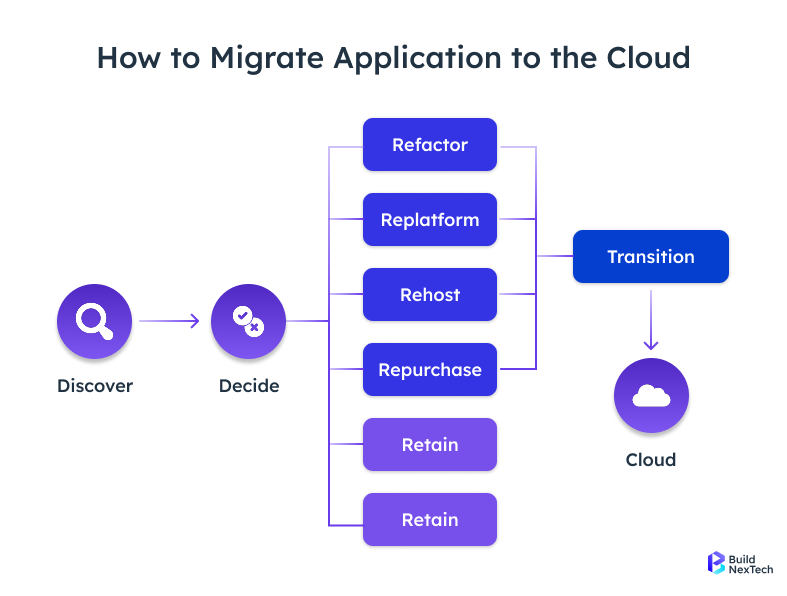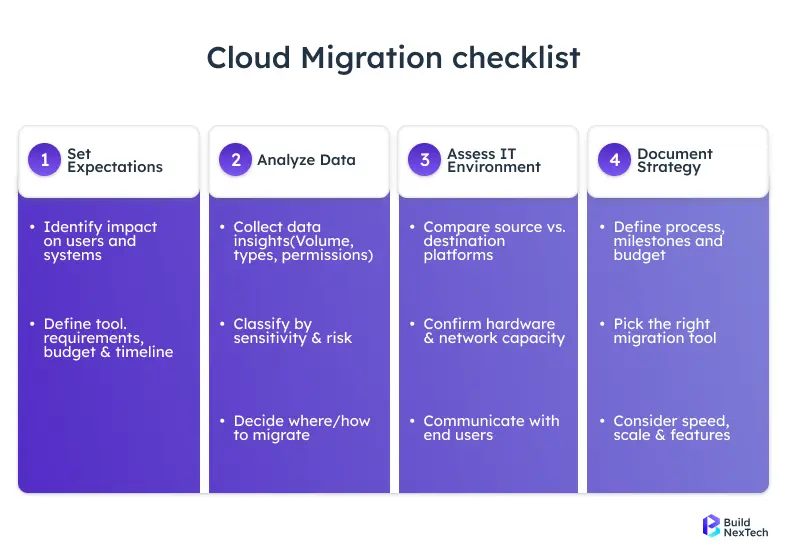Migrating to the cloud environment has shifted from being a competitive edge to a business necessity. Yet, many organizations still face delays, downtime, and cost overruns when relying only on in-house development teams. That’s where outsourced cloud migration services come in a model that combines specialized expertise, proven cloud migration strategies, and global support to accelerate results.
👉 According to a Gartner report (2024), over 70% of organizations plan to outsource at least part of their AWS cloud migration/AWS migration projects to reduce risks and achieve faster ROI. Businesses that leverage external providers experience up to 30% quicker deployments compared to those managing migrations internally.
Here’s why outsourcing is becoming the preferred choice:
- Faster deployment timelines with proven cloud architecture and cloud migration strategy execution
- Reduced risks & downtime through expert planning and execution aligned with your BCP (business continuity plan)
- Better ROI from optimized cloud computing investments and cost-effective, cost-efficient choices
- Global scalability & support beyond what in-house teams can offer
Outsourcing isn’t just about offloading work; it’s about ensuring business continuity management, minimizing downtime, enabling disaster recovery, scaling resources as needed, and improving long-term efficiency. In this blog, we’ll share 5 key reasons why outsourced teams can deliver faster results plus the extra benefits that make outsourcing the smarter choice for 2025 and beyond. (And just to clarify, when we talk about AWS Cloud Migration, we mean moving your apps, data, and workloads from on-premises systems or other clouds into a target cloud while keeping security and governance top of mind.)

What is Cloud Migration Outsourcing?
Cloud migration outsourcing refers to hiring a third-party cloud provider or Managed Service Provider (MSP) to handle the end-to-end process of migrating an organization's data, applications, and workloads to a cloud infrastructure. It includes on-premises to cloud migration and cloud-to-cloud migration across public, private, or hybrid platforms. Outsourcing cloud migration allows businesses to focus on core competencies while leveraging specialized expertise to manage application migration to cloud, AWS security/aws cloud security, and data security and compliance without heavy internal lift.
At its core, cloud migration means moving assets into a cloud environment under a well-defined cloud migration strategy with strong security compliance and IT compliance security guardrails.
Importance of Outsourcing in 2025
As more businesses adopt cloud development and data analytics, outsourcing becomes crucial for managing the complexities of on-premises to cloud migration and cloud-to-cloud migration. In 2025, organizations face pressure to stay competitive in an evolving digital landscape. Outsourcing provides access to machine learning expertise, Cloud consulting services, and Cloud Application development service capabilities, delivering cost-efficient solutions, operational efficiencies, and scalable resources.
In-house vs Outsourced Migration: Key Differences
Key Advantages of Cloud Migration
Migrating to the cloud isn’t about if, but how fast. Speed reduces IT budgets/TCO drag, cuts risk, and accelerates innovation. A timely move unlocks the benefits of cloud migration, improves protection against cyber threats, and modernizes operations with virtual machines and data analytics, all under robust AWS security and aws cloud security controls.

Business Continuity & Reduced Downtime
Extended downtime disrupts operations and revenue. By outsourcing, businesses minimize downtime and ensure continuous operations. Experienced partners align migration with your disaster recovery strategy and BCP. (BCP meaning: a documented business continuity plan that outlines how you’ll maintain critical services during disruptions.) Effective business continuity planning reduces risk across cutovers.
Faster ROI from Cloud Investments
One of the main reasons for adopting cloud migration services is achieving a faster ROI. Migrating to the cloud provides cost-effective scalability, operational efficiencies, cost reduction, and improved performance. By outsourcing, businesses can expedite their transition and realize the benefits of cloud migration sooner, improving both operational agility and customer experience.
5 Reasons Outsourced Teams Deliver Faster Results
When deadlines are tight, speed is the ultimate competitive advantage. Outsourcing cloud migration gives organizations immediate access to skilled teams with cloud computing expertise, advanced tools, and proven methodologies, avoiding months of in-house development work. By leveraging external providers, businesses can accelerate delivery, reduce bottlenecks, and focus on innovation.
Here are the 5 key reasons outsourced teams deliver faster results:
- Specialized Cloud Expertise – Skilled in public, private, and hybrid cloud platforms like AWS and Google Cloud, ensuring smooth cloud integration, data encryption, and robust security protocols.
- Proven Frameworks & Best Practices – Follow structured methodologies to minimize downtime, maintain regulatory compliance, and protect against cyber threats.
- Scalability & On-Demand Resources – Scale resources instantly with virtual machines and automation to meet tight timelines.
- Advanced Tools & Automation – Use cutting-edge tools and data analytics to streamline complex tasks like application migration and testing.
- Focus on Core Business – Internal teams stay productive while experts handle cloud architecture, cloud development, and optimize the total cost of ownership.
These factors make outsourcing not just faster but safer, more efficient, and strategically valuable for your cloud environment.
Specialized Expertise in Cloud Platforms
Outsourced teams bring deep skills across public, private, and hybrid platforms. Many providers include online project management dashboards and training — sometimes even a project management course online or project management free resources — to upskill internal teams during the engagement.
Proven Migration Frameworks & Best Practices
Partners enforce hardened baselines: AWS security/aws cloud security configurations, encryption, IAM, secrets management, network policies, and audit logging to prevent breaches. Their reference architectures and cloud migration strategy patterns reduce rework and speed approvals for security compliance and IT compliance security.

Scalability & On-Demand Resources
With Cloud consulting services, providers allocate specialized squads and infrastructure on demand, ensuring velocity while respecting budget constraints and business continuity management requirements.
Advanced Tools & Automation
Migration spans VM setup, cloud integration, testing, release orchestration, and policy automation. Outsourced teams leverage IaC, CI/CD, and observability to reduce human error. Toolchains often integrate content services (e.g., Box ,what is Box? a secure collaboration platform) and online project management to keep delivery transparent.
Focus on Core Business While Experts Handle Migration
Outsourcing frees your teams to work on product and customers while experts own architecture, guardrails, and data security and compliance. This preserves momentum and reduces operational risk.
Additional Benefits of Outsourced Cloud Migration
Beyond speed, outsourcing provides strategic upside: improved security posture, business continuity planning, and long-term cost reduction. Leading partners provide end-to-end Cloud migration services, Cloud Application development service, and Cloud consulting services to sustain modernization.
Cost Optimization & Flexibility
Professional partners ensure AWS security and AWS cloud security best practices, including encryption, identity management, and access controls. They also make cost-effective choices while explaining the cost-effective meaning in real business terms.
Security & Compliance Expertise
Migration exposes businesses to risks like cyber threats, data breaches, and security vulnerabilities. Outsourced teams implement strong security protocols, ensure regulatory compliance, and apply multi-factor authentication for maximum safety.
24/7 Global Support & Monitoring
One of the significant benefits of outsourcing is round-the-clock support. With Managed Service Providers, your business gets 24/7 monitoring and timely resolution of migration issues across any cloud environment.
How to Choose the Right Cloud Migration Partner
Selecting the right partner can make the difference between a seamless transition and a costly setback. The right cloud provider should not only handle migration but also act as a strategic advisor for data analytics, cloud integration, and customer experience optimization.
Key Factors to Evaluate
When choosing a cloud migration partner, evaluate the following:
- Proven expertise in public cloud, private cloud, or hybrid cloud migrations
- Strong security focus: data encryption, security protocols, regulatory compliance
- Cost-effective approaches to optimize total cost of ownership
- Ability to deliver within time and IT budget constraints
- Support for cloud development, modernization, and post-migration optimization

Questions to Ask Before Outsourcing
Before outsourcing cloud migration, ask potential partners these questions:
- What cloud migration strategy do you recommend?
- How do you align migration with disaster recovery and business continuity planning?
- What tools do you use for cloud integration and application migration?
- How do you prevent cyber threats and manage security vulnerabilities?
- Do you provide support for Google Cloud, AWS, or other platforms?
Final Thoughts on Outsourced Cloud Migration in 2025
As businesses adopt cloud computing at scale, outsourcing continues to be the foundation for staying competitive in a fast-moving digital economy. The growing complexity of cloud infrastructure, rising concerns about cyber threats, and the demand for seamless customer experience make it clear that organizations cannot afford to rely solely on in-house development teams. By partnering with specialized Managed Service Providers (MSPs), companies gain access to proven frameworks, advanced automation, and 24/7 global support ensuring faster deployments, stronger regulatory compliance, and robust disaster recovery strategies.
At BNXT, we understand that successful migration is not just about moving workloads; it’s about creating a future-ready cloud environment that unlocks innovation. Our expertise spans public cloud, private cloud, and hybrid cloud solutions, helping businesses design resilient cloud architecture while ensuring data encryption, protection against data breaches, and cost-efficient operations. With a strong focus on security protocols, data analytics, and cloud development, BNXT empowers organizations to reduce total cost of ownership, optimize IT budgets, and maximize ROI.
Looking ahead to 2025 and beyond, outsourcing cloud migration will play an even greater role in enabling enterprises to scale, innovate, and respond quickly to market demands. By choosing BNXT as your trusted cloud provider, you’re not just outsourcing migration, you’re investing in a long-term partner committed to accelerating transformation, mitigating risks, and ensuring business continuity. With BNXT’s proven expertise in cloud integration, machine learning, and virtual machine optimization, we deliver faster results while keeping your growth secure, compliant, and future-ready.
People Also Ask
What are the risks of outsourcing cloud migration?
Risks include misalignment with goals, poor communication, or weak data security and compliance. The right partner mitigates these with strong security compliance and IT compliance security.
Can small businesses benefit from outsourced cloud migration?
Yes. SMBs gain access to enterprise-grade Cloud consulting services and cloud migration strategy frameworks without heavy in-house investment.
How much does outsourcing cloud migration cost?
Costs depend on scope, platform (e.g., AWS migration), and service model. Some providers bundle enablement, such as an online project management toolkit, a project management course online, or even project management free resources.
What factors affect the timeline of a cloud migration project?
Data volume, application complexity, cloud-to-cloud migration vs on-premises to cloud migration, and provider efficiency.


























.webp)
.webp)
.webp)

